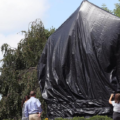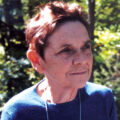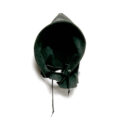Implied Freedom: Rich’s Radical Writer/Teacher

I am a writer, primarily of poems, but also of criticism, essays, and fiction. Over the last decade I have taught courses in geology, ecology, outdoor living skills, and writing. I’ve taught on salt marshes and mesas, in canoes and classrooms. Currently, I teach composition and creative writing at the University of Washington. I’ve always struggled to stay connected to my motives for teaching; sometimes the unending logistical problems, standardized curricula, apathetic students, and myriad other frustrations crowd out whatever meaning I used to find, and the whole effort seems futile. My own writing flounders, maybe because each moment of teaching is fraught with all the difficulties inherent in every kind of communication.
We have come to expect that even the most eminent writers will also teach, to pay for their housing, food, health insurance, etc. We’ve come to assume that writing doesn’t provide for the material life of the writer. This presumption numbs both readers and other writers to the not insubstantial difficulties of life as a writer/teacher. Even in a relatively stable position (i.e. anything but adjunct), teaching challenges a writer’s devotion to language on a daily basis, and these complications can’t be stowed away in the classroom. They follow the teacher home, to the library, to the coffee shop, where she tries to work through a poem but can’t forget the pile of papers waiting for her comments.
Life as a writer/teacher must be a constant coming to terms with language, so the classroom must take on the same critical dimensions as the written word. If not, the writer/teacher is forced to construct a debilitating façade: that writing is easy, that language is universal, that there is one way for it to be done. Many of my composition students expect me to teach them rules or tricks to write “well”. While there are techniques I do teach them, regimented structures aren’t particularly effective. But the critical analysis that cultivates awareness—an awareness that spans geographic locations and academic disciplines—is much more useful.
I ask my students, whether they are reading or writing, to examine and question the text. What is the identity of the writer, and who is her audience? What are the questions she is pursuing? What are the questions that respond to those questions? How can she use the tool of language to broach subjects important to her and make their importance resonate in the public space of the page? How can she use language to transfer meaning from one conscious person to another? What’s at stake in that transfer? If we are to make teaching sustainable for writers, we must confront the classroom unmasked and teach students our true practice of writing.
For Adrienne Rich—as for many educators working today—teaching and social change were inseparable practices, both linked to consciousness of the self and to the community. The call to become an educator often echoes the desire to foster a better, more just world into existence. Rich turned her attention to education as a response to the injustices she witnessed and experienced, and in that act she renegotiates “the priority of recreating ourselves and each other, after our centuries of intellectual and spiritual blockading.” In her own life, writing generated that agency: she explored and reconfigured herself through poetry. Likewise, social change for Rich meant teaching students to understand and employ language, while learning from them how to better live out her feminist community values.
“I think of myself as a teacher of language: that is, as someone for whom language has implied freedom, who is trying to aid others to free themselves through the written word, and above all through learning to write it for themselves.” On one hand, Rich is smart enough to know that one class in composition will not magically change her students’ social status. But her fundamental belief in language, as a writer, helps her show students how to reconcile, through language, the harm that has been done to them by language.
Part of that harm is inherent in an educational system that continues, today, to oppress the poor and disadvantaged. In an observation that seems remarkably relevant to modern-day testing culture, Rich bemoans that learning is traditionally and patriarchally framed as a conquest of one idea over another, a meme that infects her students’ understanding of moral structures and the production of social values. She calls for teachers to reject the paradigm of language as a conquest, to connect our own humanity to each student’s individual social context.
In “Taking Women Students Seriously,” Rich addresses the importance of “remembering that every mind resides in a body, remaining accountable to the female bodies in which we live; constantly retesting given hypotheses against lived experience.” How urgent our bodies are, and how astute and compassionate Rich urges us to be toward them. The mind is contingent on the body; the female body, the white, black, Asian, Latino body each houses a mind capable of creating language that wields power, a mind shaped by the history of that body, by what that body signifies in society. If we are to teach students to write powerful and effective work to change their own lives and the lives of others, they must read and analyze writers from a range of different identities, each of which is interrogated as human testimony of lived experience.
“One important thing we can do is discuss the context,” Rich assures the wary teacher in “Taking Women Students Seriously.” That’s because, as she argued years prior in “Toward a Woman-Centered University”, the “needs of women are congruent with the humanizing of the community at large.” This is why teaching literature, contemporary and past, outside of the so-called canon, and getting students to acknowledge its value, is so important. If there is only a proscribed canon, chosen by prior generations—if the reading of a text is prescribed for the reader—then there is no contemporary self-making in learning. Students need analytical, not judgmental, tools to understand themselves and each other. They need to recognize difference without also needing to conquer and erase it.
How do we help students to develop or discover agency in creating their own identities through language and text? “Language is such a weapon, and what goes with language: reflection, criticism, renaming, creation,” Rich writes in “Teaching Language in Open Admissions.” When she assigned Turgenev’s Fathers and Sons, many of her black, New York-dwelling students challenged the seemingly obtuse book. “I told them I had asked them to read it because I believed it was meaningful for them,” she writes, “if it was not, we could talk and write about why not and how not.” Of course, saying such a thing is easy; the practice of it, as she knew, is incredibly difficult. But in the world of literature, we can teach students to understand past structures through past texts critiqued under a new paradigm. We can use new texts to ask new questions and treat students as agents in the literary pursuit of humanity.
“What interests me in teaching,” writes Rich, “is less the emergence of the occasional genius than the overall finding of language by those who did not have it and by those who have been used and abused to the extend that they lacked it.” Teaching writing is teaching students to question the conditions to which they have become acculturated. With so many young people marginalized by borderline illiteracy, teaching them to recognize their own conditions within literary texts is some of the most important work possible.
The potential for a new locus of power is what intrigues Rich; for me, that might be too lofty an aspiration. However strong Rich’s devotion to teaching writing as a vehicle for social change, few writing programs—few education systems as a whole—have been able to achieve tangible social goals. In fact, in the forty years since Rich wrote these essays, American social conditions have changed for the worse. Existing structures are resilient. Rich writes that “the fantasy of the family as consisting of a breadwinning father, a homemaking mother, and children is the model on which most social constructs are based.” While parts of that model have shifted, others stagnate. In “Toward a Woman-Centered University” Rich devotes thousands of words to policy changes (child care, health care, working conditions, housing, and others) that must take place for social progress to be possible. None of these have come to pass. Today’s social safety net is sparsely-woven, thinning in parts, elsewhere riddled with holes. Wealth disparity continues to grow. Racial disparity has grown. Gendered violence and systemic marginalization persist. And the basic writing program, the type in which Rich taught in the 1970s, doesn’t even exist today.
The failure of traditional educational models to change the social landscape has left these and many other obstacles to progress. Adrienne Rich’s radical vision—of teachers and students engaged in a common struggle for justice—may be one way forward.
About Rachel Edelman
Rachel Edelman writes essays and poems. Follow her on Twitter @rachelsedelman.





